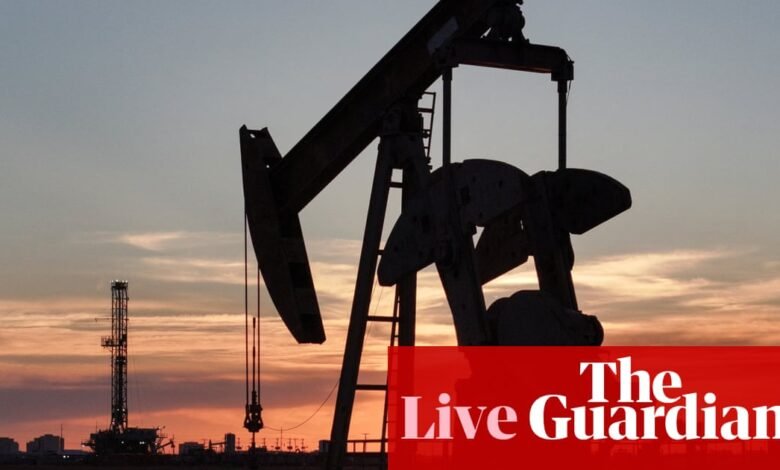IMF chief warns of broader risks from US strikes on Iran, as oil falls back from five-month high – business live | Business

Introduction: Oil dips back from five-month high amid Iran crisis
Good morning, and welcome to our rolling coverage of business, the financial markets and the world economy.
The oil price has hit its highest level since January, after the US bombed Iran’s nuclear facilities over the weekend.
Traders are in a largely risk-off mood, as they weigh up the chances of further escalation in the Middle East, and ponder possible Iranian retaliations. But there’s not a full-blown panic in the markets.
There was an early leap in the oil price when the new trading week began; crude prices surged over 4%, pushing a barrel of Brent crude to a five-month high of $81.40 per barrel (up 5.7% on the day).
But… it’s slipped back even before traders in the City of London reached their desks, and is now up 1.7% at $78.32 per barrel.
Yesterday, Iran’s parliament voted to shut down the Strait of Hormuz, though which a fifth of the world’s oil is transported. If it happened, that could create a supply shock that drives up the price of energy, fuelling inflation and hurting growth.
In response, Marco Rubio, the US secretary of state, warned it would be “economic suicide” for Iran to close the Strait, and urged China to sway Tehran on this point.
Rubio told Fox News:
“I encourage the Chinese government in Beijing to call them about that, because they heavily depend on the Straits of Hormuz for their oil.”
Holger Schmieding, chief economist at Berenberg Bank, says the Strait of Hormuz is “the key economic risk to watch”. But, he also argues that a protracted disruption to energy flows in the Gulf region “seems unlikely”, as trying to throttle energy exports would be a high-risk strategy for Tehran.
Schmieding told clients this morning:
For more than two decades, the Iranian regime has sought to destabilise various parts of the Middle East. On its own, a big setback to Iran‘s apparent attempt to acquire nuclear weapons should count as a positive.
In the short run, the US “one off“ strike against three Iranian nuclear facilities raises the geopolitical risks in the region to a new level. Markets will probably shift into “risk off” mode as they await the Iranian response. In the long run, however, a severely weakened Iranian regime could turn into a significant positive for the region.
The agenda
-
Today: UK government to publish its industrial strategy
-
9am BST: Eurozone flash PMI manufacturing and services survey for June
-
9.30am BST: UK flash PMI manufacturing survey and services for June
-
2pm BST: Christine Lagarde testifies to the Committee on Economic and Monetary Affairs of the European Parliament in Brussels
-
2.45pm BST: US flash PMI manufacturing survey and services for June
Key events
Oil slips back from five-month highs
Oil has slipped back from its earlier highs, and is now slightly down this session.
Brent crude is now trading at $76.85 per barrel, down 0.25% today (it closed at $77.01/barrel on Friday night). Its early spike to $81.50 per barrel, a five-month high, has not lasted long.
AJ Bell investment director Russ Mould says:
“The markets are not yet reacting with any degree of panic to the US airstrike on Iran’s nuclear facilities as they await to see how Tehran responds.
The promised two-week hiatus as the US weighed its decision didn’t materialise as the Trump administration acted on Saturday. After briefly spiking above $80 per barrel when the market opened in Asia on Monday, Brent pared those gains to trade modestly higher.
UK company growth hits three-month high
Growth across UK businesses accelerated slightly this month, but remains weak.
The latest poll of purchasing managers at British companies shows that output picked up this month, as the private sector recovered from a drop in April.
The services sector expanded, while manufacturing shrank again.
Some companies reported a pick-up in order books, and client confidence, after the US rolled back its tariff announcements.
But, global trade tensions and “rising geopolitical uncertainty” were cited as headwinds to growth, particularly in manufacturing.
Overall, the flash UK PMI composite output interest rose to 50.7 this month, from 50.3 in May, showing the fastest growth in three months.
S&P Global, which produces the report, says it is consistent with economic growth of around 0.1% in the April-June period.
Chris Williamson, chief business economist at S&P Global Market Intelligence, says:
“The UK economy remained in a sluggish state at the end of the second quarter, according to the early PMI survey data.
“Although business conditions have continued to improve since April’s downturn, quelling recession fears, growth of business activity remains disappointingly lacklustre.”
Airlines are weighing up how long to suspend Middle East flights, after the conflict in the region entered a new phase with the US attacs on Iran, Reuters reports.
Leading Asian carrier Singapore Airlines, which described the situation as “fluid”, moved to cancel flights to Dubai through to Tuesday, having previously cancelled only its Sunday service.
IAG group member Iberia cancelled Sunday’s and Monday’s Doha flights after making its own assessment, a spokesperson said. It has not made a decision regarding later flights.
Air France KLM cancelled flights to and from Dubai and Riyadh on Sunday and Monday, and Finnair cancelled flights from Doha until at least Tuesday.
Kazakhstan’s Air Astana cancelled flights to Dubai on Monday.
More here: Airlines weigh Middle East cancellations after US strikes in Iran
Over at Heathrow, a BA flight to Dubai that was due to leave at 12.50pm today has been cancelled, as has a 1.45pm Doha flight (although a 9.25pm flight to Doha is still shown to be operating…)
Eurozone growth stalling in June
The eurozone economy has continued to flirt with stagnation this month, with little growth in its key sectors.
The latest survey of purchasing managers across the euro area, just released by S&P Global, shows that the eurozone services sector is stalling this month, while factory growth slowed.
Firms reported another drop in new orders but, more encouragingly, business confidence improved to the strongest since the start of 2025.
German business activity returned to growth in June, but French output fell further during the month.
This has left the HCOB flash eurozone composite PMI output index unchanged at 50.2 (any reading over 50 shows growth).
Dr. Cyrus de la Rubia, chief economist at Hamburg Commercial Bank, says:
“The eurozone economy is struggling to gain momentum. For six months now, growth has been minimal, with activity in the service sector stagnating and manufacturing output rising only moderately.
In Germany, there are signs of a cautious improvement in the situation, but France continues to drag its feet. The momentum evident in the official growth figure of 0.6 percent for the first quarter is unlikely to have carried over into the second quarter, especially since special factors such as Ireland’s unusual jump in growth inflated this figure.
However, there is no reason to be resigned, as the outlook has brightened according to the survey and companies are keeping employment roughly constant.
Japan’s currency has weakened today, as traders suspect that higher oil prices would hurt its economy.
The yen has lost 0.8% against the US dollar, dropping to ¥147.24/$ from ¥146.07/$ on Friday night, extending its recent losses.
Lee Hardman, senior currency analyst at MUFG, explains:
Yen weakness could initially reflect investor concerns that Japan’s economy would be hit harder by higher oil prices given its reliance on energy imports from the region, and the potential for inflationary fears to lift yields more outside of Japan.
The flight to quality bid in response to US missile strikes on Iran has not been sufficient to reverse the yen weakening trend that has been in place recently which has been encouraged as well by BoJ caution over raising rates given elevated uncertainty related to trade policy and geopolitical risks in the Middle East.
European stock markets are also down in early trading.
France’s CAC has lost 0.65%, Spain’s IBEX is down 0.6%, and Germany’s DAX lost 0.55% at the open.
That’s a fairly muted reaction to the US bombing of Iran over the weekend.
Mohit Kumar of investment bank Jefferies says the markets are waiting to see how Iran reacts, adding:
Current market open suggests that base case is for a token response which will allow Iran to claim a counter-attack but with the aim of de-escalation.
Key would be whether Iran would (or could) close the strait of Hormuz and disrupt global oil supply. With US and Israel planes reported to have almost clear access to Iran’s airspace, the closure of the strait would be practically impossible.
Jefferies’ base case scenario is that we now enter a period of uncertainty lasting a few weeks, but without a sharp escalation.
Kumar cautions that Jefferies are not “fully convinced” by the market’s sanguine reaction, explaining:
We would advise using the limited reaction to reduce risk exposure in equities and credit. We are not geo-political experts. While we agree that Iran’s retaliatory capabilities may be significantly reduced, it could still use drones and smaller weapons to maintain a heightened level of uncertainty for some time.
We don’t see a closure of the Hormuz strait but see possibility of disruption. Any attacks on US interests in the Gulf region could also escalate tensions further.
FTSE 100 opens in the red
The UK stock market has dropped at the start of trading, as traders weigh up the situation in the Middle East.
Airline shares are down, with easyJet (-2.1%) and British Airways parent company IAG (-2.2%) leading the fallers on the FTSE 100 share index. Higher oil prices push up their costs, while the crisis could also lead to flight cancellations.
Update: Yesterday, BA cancelled flights from London to Dubai and Doha.
BP (+1.7%) and Shell (+1%) are leading the risers.
Overall, the FTSE 100 index is down 23 points or 0.26% at 8751 points, away from the record closing high set earlier this month.
Spectris agrees £3.8bn takeover offer…
The new week has also begun with some takeover excitement in the City of London.
Spectris, the UK-based maker of precision and testing equipment and software, has agreed to be bought by private equity firm Advent in a £3.8bn deal.
Spectris develops high-tech instruments, testing equipment and software used in sectors such as life sciences, automotive, electronics and semiconductors. It is recommending the offer, which is an 84.6% premium to its value before news of Advent’s interest broke earlier this month.
But the battle may not be over. Rival private equity firm Kohlberg Kravis Roberts (KKR) hasn’t abandoned its own interest in Spectris.
KKR just told the City that it has been “engaging constructively” with the board of Spectris, having made its own takeover proposal at the start of June.
While no revised proposal has yet been made, KKR insists it is actively engaged in the advanced stages of due diligence and arranging financing commitments, and urges Spectris’s shareholders to take no action with regards to the Advent offer….
Analysts at RBC Capital Markets say there is “a clear and present risk of energy attacks” in the Middle East, as Iran weighs up its response.
That threat could come from the Iran-backed militias in Iraq that operate near the Basra energy facilities, they suggest.
In a note this morning, RBC point out it may take days, or weeks, before we know the Iranian response, adding:
Above all, we would caution against the knee-jerk “the worst is behind us” hot take at this stage. President Trump may indeed have successfully executed an “escalate to de-escalate” move, but a wider expansion cannot still be ruled out at this juncture.
We may be in the Rumsfeld “unknown knowns” matrix in this nine-day Middle East military conflict.
Stock markets across the Asia-Pacific region are mixed today, as investors take events in the Middle East in their stride
Japan’s Nikkei 225 index has dipped by 0.17%, while Australia’s S&P/ASX 200 index has lost 0.35%.
The mood in China is brighter, though, where the CSI 300 index is up 0.44%. Hong Kong’s Hang Seng has gained 0.55%.
Ipek Ozkardeskaya, senior analyst at Swissquote Bank, says there is a “fascinating calm” in the markets after the US attack on Iran, adding:
Global equities will likely remain under pressure at the open – but judging by how oil prices reacted to the weekend news, the selloff could remain relatively soft compared with the heaviness of the headlines.
S&P futures [the US stock market] are down about 0.30% – they’re behaving like a normal Monday. And that, I find extremely interesting. It really feels like markets have become increasingly unreactive to the news. The lack of reaction is fascinating.
The US dollar has risen, a little, against a basket of currencies today as investors seek out safe haven assets.
The dollar index has gained 0.3% this morning, while the pound has slipped by 0.1% to $1.3433.
Carol Kong, currency strategist at Commonwealth Bank of Australia, said the markets are in wait-and-see mode on how Iran responds, with more worries about the positive inflationary impact of the conflict than the negative economic impact.
Kong explains:
“The currency markets will be at the mercy of comments and actions from the Iranian, Israeli and U.S. governments.
The risks are clearly skewed to further upside in the safe haven currencies if the parties escalate the conflict.”
IMF’s Georgieva warns of growth risks from US strikes on Iran
The head of the International Monetary Fund has warned that last weekend’s US strikes on Iran could hurt global growth, if the consequence ripple beyond the energy markets.
Kristalina Georgieva told Bloomberg TV this morning that the Middle East crisis added to global uncertainty, explaining:
“We are looking at this as another source of uncertainty in what has been a highly uncertain environment.”
Georgieva said the IMF was watching energy prices closely, warning that a rise in oil prices could have knock-on economic impact. She says:
“There could be secondary and tertiary impacts. Let’s say there is more turbulence that goes into hitting growth prospects in large economies — then you have a trigger impact of downward revisions in prospects for global growth.”
Georgieva is also hoping that energy supply routes will not be disrupted, saying:
“Let’s see how events will develop.
I pray no.”
IMF’s Kristalina Georgieva warned that the US strikes on Iran could potentially have broader impacts beyond energy channels, as global uncertainty escalates https://t.co/yqdC6u3HMF
— Bloomberg (@business) June 23, 2025
Introduction: Oil dips back from five-month high amid Iran crisis
Good morning, and welcome to our rolling coverage of business, the financial markets and the world economy.
The oil price has hit its highest level since January, after the US bombed Iran’s nuclear facilities over the weekend.
Traders are in a largely risk-off mood, as they weigh up the chances of further escalation in the Middle East, and ponder possible Iranian retaliations. But there’s not a full-blown panic in the markets.
There was an early leap in the oil price when the new trading week began; crude prices surged over 4%, pushing a barrel of Brent crude to a five-month high of $81.40 per barrel (up 5.7% on the day).
But… it’s slipped back even before traders in the City of London reached their desks, and is now up 1.7% at $78.32 per barrel.
Yesterday, Iran’s parliament voted to shut down the Strait of Hormuz, though which a fifth of the world’s oil is transported. If it happened, that could create a supply shock that drives up the price of energy, fuelling inflation and hurting growth.
In response, Marco Rubio, the US secretary of state, warned it would be “economic suicide” for Iran to close the Strait, and urged China to sway Tehran on this point.
Rubio told Fox News:
“I encourage the Chinese government in Beijing to call them about that, because they heavily depend on the Straits of Hormuz for their oil.”
Holger Schmieding, chief economist at Berenberg Bank, says the Strait of Hormuz is “the key economic risk to watch”. But, he also argues that a protracted disruption to energy flows in the Gulf region “seems unlikely”, as trying to throttle energy exports would be a high-risk strategy for Tehran.
Schmieding told clients this morning:
For more than two decades, the Iranian regime has sought to destabilise various parts of the Middle East. On its own, a big setback to Iran‘s apparent attempt to acquire nuclear weapons should count as a positive.
In the short run, the US “one off“ strike against three Iranian nuclear facilities raises the geopolitical risks in the region to a new level. Markets will probably shift into “risk off” mode as they await the Iranian response. In the long run, however, a severely weakened Iranian regime could turn into a significant positive for the region.
The agenda
-
Today: UK government to publish its industrial strategy
-
9am BST: Eurozone flash PMI manufacturing and services survey for June
-
9.30am BST: UK flash PMI manufacturing survey and services for June
-
2pm BST: Christine Lagarde testifies to the Committee on Economic and Monetary Affairs of the European Parliament in Brussels
-
2.45pm BST: US flash PMI manufacturing survey and services for June




